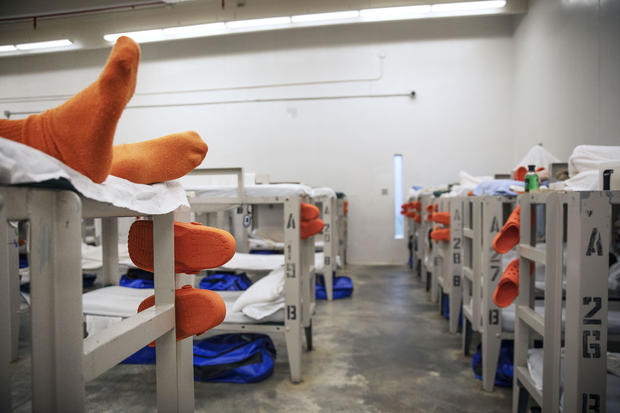Just over 1,300 immigrants detained by U.S. Immigration and Customs Enforcement (ICE) have received two doses of the COVID-19 vaccine, even as the number of detainees and infections among them surge, according to data obtained by CBS News.
ICE was holding more than 27,000 immigrants as of last week, an 82% increase from the start of the Biden administration in late January, when the detainee population stood below 15,000. During that same time period, over 10,000 COVID-19 cases among detainees have been reported, according to a CBS News analysis of ICE data.
Overall, ICE has reported over 19,000 COVID-19 infections and nine virus-related deaths among immigrants in its custody throughout the pandemic. As of earlier this week, there were 900 active cases in 51 detention facilities overseen by ICE.
As of this week, 8,221 immigrants in ICE detention had received one dose of the COVID-19 vaccine, a 200% increase from early May, according to figures ICE shared with Congress. But the number of detainees who have received two doses — 1,307 — represents only a 6% increase during that same time period.
ICE did not say whether any of the detainees have received the Johnson & Johnson vaccine, which requires one dose. The agency also did not provide a tally of detained immigrants who have refused vaccination.
For comparison, more than 83,000 people in the custody of the Federal Bureau of Prisons — or 54% of the federal inmate population — have been fully vaccinated, according to agency data.
Unlike people in state and federal custody, immigrants in ICE detention are detained solely for immigration violations, not because of criminal sentences. The agency holds asylum-seekers, recent border-crossers and other immigrants the government seeks to deport, including green card holders who have finished criminal sentences.
Public health experts and advocates for immigrants criticized ICE’s vaccination efforts, saying the agency should have inoculated more detainees by now given the ample supply of doses in the U.S.
“Given the availability of vaccines in the U.S., the fact that the rollout in ICE detention is so slow is concerning and is keeping people in these settings at risk,” Dr. Ranit Mishori, a Georgetown University School of Medicine professor who monitors immigration detention, told CBS News. “And it’s a shame because we do have the supply.”
Mishori, who is also a medical advisor for Physicians for Human Rights, warned that unvaccinated immigrants in crowded detention facilities could become “sitting ducks.”
“With the risk of the Delta variant coming into ICE detention facilities, it is going to be a nightmare and I don’t know what they are waiting for,” Mishori added. “We are in a race and we need to get everybody vaccinated as soon as possible, particularly in these very high-risk settings such as ICE detention.”
Unlike the Federal Bureau of Prisons, which received a federal allocation of vaccines, ICE has relied on states to provide doses to its network of more than 200 detention facilities. Since each state sets distinct allocation priorities, the vaccination of ICE detainees has been inconsistent across the country.
In a statement, ICE said it was working “to receive its own allocation of vaccines for immediate, nationwide distribution.”
“The COVID-19 vaccine is one of the most effective ways to protect all our communities from the disease and control the pandemic,” the agency said in its statement. “As part of the Department of Homeland Security’s vaccination efforts, U.S. Immigration and Customs Enforcement is further expanding its vaccination efforts to include voluntary vaccinations for individuals in its care and custody.”
In a federal court filing last month, Biden administration lawyers conceded that ICE “could not manage the delivery of vaccines to all facilities for detainees,” saying the agency “does not have medical authority” over detention centers that are not staffed by its Health Service Corps, which only serves 20 facilities.
ICE could “potentially” offer vaccines to detainees held at the facilities staffed by the Health Service Corps, the Justice Department lawyers added, but the agency “does not have its own source of vaccines and cannot purchase its own supply.”
The government lawyers cited this to argue against a recommendation for ICE to offer vaccination to all detainees with chronic medical conditions or those over the age of 55. Doing so is “not logistically possible,” the lawyers representing ICE said.
Later in June, U.S. District Court Judge Jesus Bernal adopted the recommendation and ordered ICE to immediately offer vaccination to these vulnerable immigrants in detention. The agency has until July 23 to do so.


